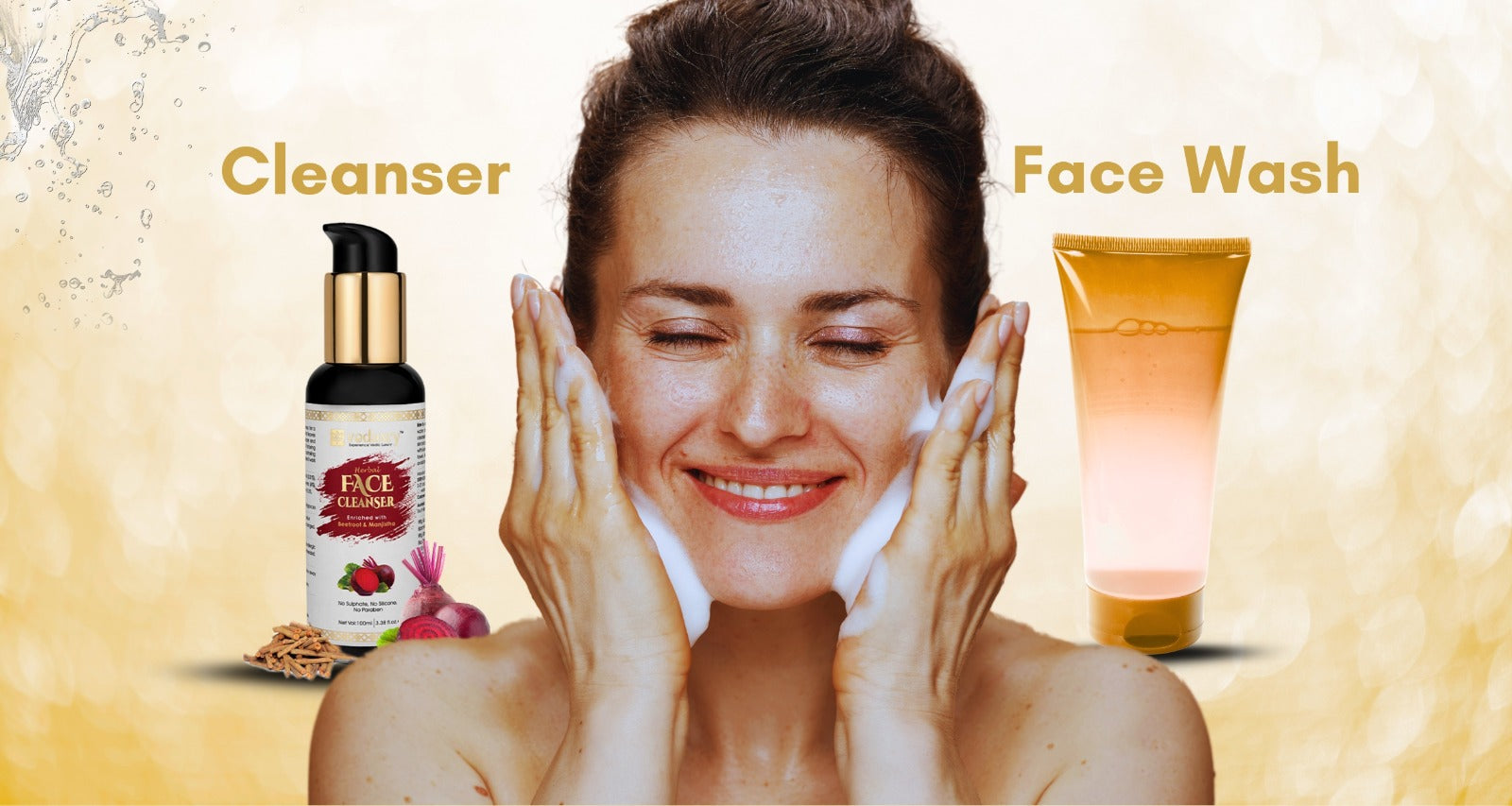Face Wash vs. Cleanser: Understanding the Profound Difference in Skincare Rituals with Vedaxry

In the nuanced world of skincare, even seemingly interchangeable terms—face wash and cleanser—carry distinct connotations. While both are crafted for facial purification, they operate through fundamentally different mechanisms and cater to varied skin requirements. This article elucidates the difference between face wash and cleanser, offering insights through a dermatological lens, while emphasizing how Vedaxry’s Cleanser and Face Wash elevate this essential skincare step.
What is the Difference Between Face Wash and Cleanser?
At a superficial glance, both serve the same purpose: to remove impurities. However, a closer evaluation reveals divergent formulations, textural characteristics, and skin-specific functionalities.
Face Wash: The Vigorous Purifier
Face wash is engineered for a deeper, more rigorous cleansing experience. It is designed to dismantle environmental pollutants, excessive sebum, and cosmetic residues with precision.
-
Texture & Composition: Predominantly gel-based or foamy, face washes are rich in surfactants, which enable intense lathering and deep pore detoxification.
-
Ideal For: Oily, acne-prone, and congested skin types that demand stringent sebum control.
-
Skin Impact: Due to its astringent nature, a face wash may strip the epidermis of natural oils if overused—hence, it mandates a post-wash hydration ritual.
Cleanser: The Gentle Refiner
Facial cleansers are milder, non-foaming formulations tailored to maintain the skin’s delicate barrier. Their objective is not just cleansing, but nurturing.
-
Texture & Composition: Available in lotion, cream, micellar, oil, or balm formats, cleansers often incorporate emollients and humectants to simultaneously cleanse and hydrate.
-
Ideal For: Dry, sensitive, or mature skin where barrier integrity is paramount.
-
Skin Impact: Unlike face washes, cleansers uphold the skin’s pH and lipid profile, making them perfect for regular use—even multiple times a day.
Which Should You Choose – Cleanser or Face Wash?
The decision is predicated on individual skin typology, environmental exposure, and cosmetic habits. Here’s a tailored guide:
For Oily/Acne-Prone Skin
Face washes, especially those infused with tea tree, neem, salicylic acid, or activated charcoal, excel at sebaceous regulation. They exfoliate dead skin and unearth clogged pores—ideal for those battling acne or excess shine.
Use Vedaxry’s Organic Sulphate-Free Face Wash—formulated to balance oil production without provoking dryness.
For Dry or Sensitive Skin
Cream-based or oil cleansers, such as Vedaxry’s Ultra-Hydrating Organic Cleanser, cleanse without compromising the lipid barrier. They preserve suppleness and soothe inflamed or reactive skin.
For Combination Skin
Consider a dual-cleansing routine—a gentle cleanser in the morning and a foaming face wash in the evening.
For Normal Skin
Either can work depending on your preference. Use Vedaxry Cleanser in drier seasons and switch to the face wash during warmer, oilier months.
How Often Should You Use a Face Wash or Cleanser?
Cleansers:
Mild and hydrating cleansers can be employed twice daily. They’re ideal for morning routines to remove overnight sebum, and at night to dissolve residual dirt or light makeup.
Face Washes:
While typically used once or twice daily, if your face wash contains potent actives like benzoyl peroxide or glycolic acid, it is advisable to alternate use or restrict to nighttime—especially for sensitive skin.
Types of Cleansers and Their Skin Affinities
-
Gel Cleansers – Lightweight and oil-free; ideal for oily or acne-prone skin.
-
Cream Cleansers – Rich and comforting; excellent for dry or mature skin.
-
Oil Cleansers – Dissolve makeup and debris while hydrating.
-
Micellar Water – Non-rinsing and versatile; gentle for all skin types.
-
Clay-Based Cleansers – Draws out impurities from congested skin.
-
Powder Cleansers – Mildly exfoliating; suitable for combination skin.
Types of Face Washes and Their Unique Benefits
-
Foaming Face Washes – Deep cleansing with lather; perfect for oily skin.
-
Gel Face Washes – Non-comedogenic and cooling; great for acne-prone users.
-
Cream/Lotion-Based Washes – Softer on the skin, ideal for dry or inflamed skin.
-
Exfoliating Face Washes – Contains physical or chemical exfoliants; use 2–3 times a week.
-
Clay-Infused Washes – Absorbs excess oil; suitable for blackhead-prone skin.
-
Medicated Face Washes – Include actives like salicylic acid for clinical-grade cleansing.
Vedaxry Cleanser vs Vedaxry Face Wash: Which One Should You Pick?

Vedaxry Cleanser is formulated with botanical oils, floral waters, and antioxidant-rich herbs to provide gentle, Ayurvedic cleansing. It’s suitable for dry, dehydrated, or sensitive skin types and works well in both AM and PM routines.
Vedaxry Face Wash, on the other hand, is ideal for users with oily or combination skin. Its sulphate-free, pH-balanced formula ensures deep cleansing without causing irritation or tightness.
Both are paraben-free, cruelty-free, and free from artificial fragrances, echoing Vedaxry’s commitment to clean and conscious beauty.
Expert Tips for Effective Use
-
Always cleanse with lukewarm water—not hot, to avoid dehydration.
-
Double cleansing at night (oil-based cleanser followed by face wash) is beneficial for makeup wearers or those exposed to pollution.
-
Follow with toner and moisturizer immediately after to lock in hydration.
-
Never sleep with unwashed skin—this accelerates aging and invites breakouts.
Conclusion: Choose According to Your Skin's Intelligence
Understanding the difference between face wash and cleanser is not just about semantics—it’s a crucial distinction that can elevate your skincare regime. By discerning your skin’s inherent nature and environmental stressors, you can select a product that respects your skin's physiology.
Whether it’s the gentle elegance of Vedaxry Cleanser or the purifying might of Vedaxry Face Wash, make your choice based on intelligent skin compatibility, not just trend. Let your skincare be mindful, Ayurvedic, and tailored.

Reviewed By
Dr. Sapna Kangotra
Senior Ayurveda Doctor




Comments